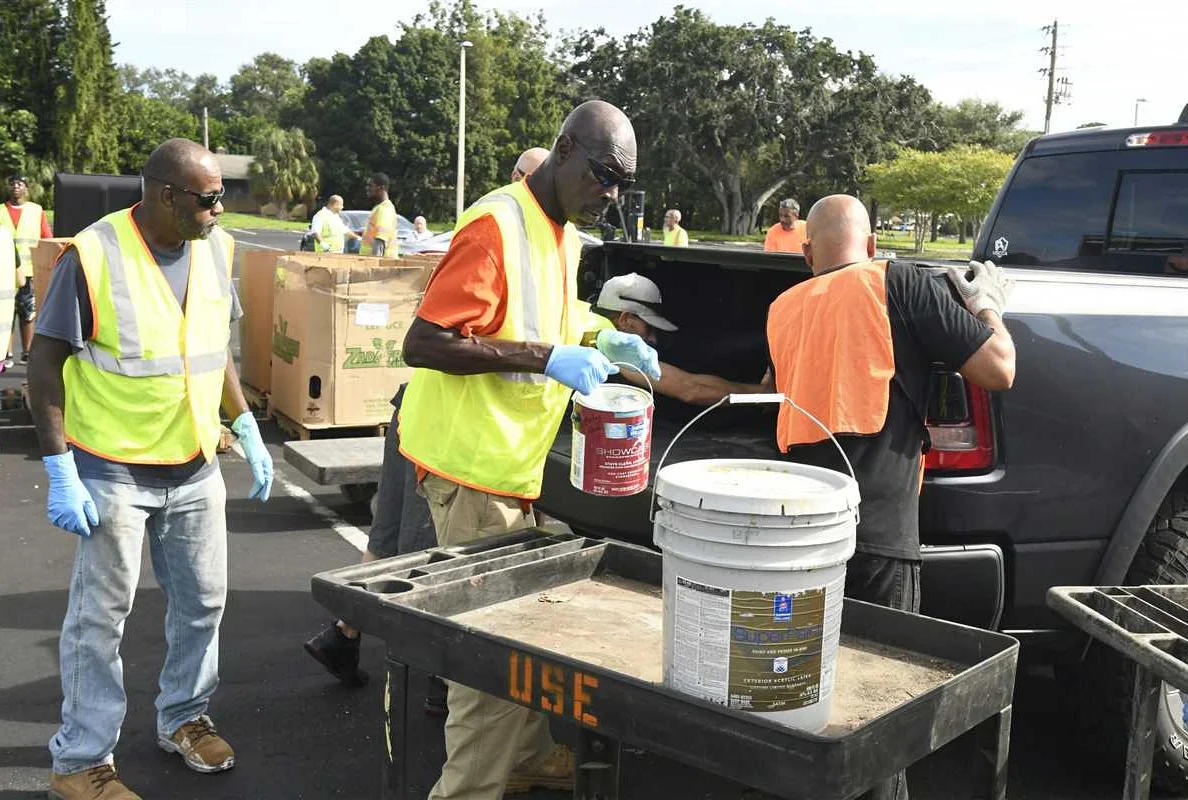In St. Petersburg there is no place to dispose of hazardous medical waste
Содержимое
Discover the growing problem of hazardous medical waste disposal in St. Petersburg, Russia. Learn about the lack of proper facilities and the potential dangers it poses to public health and the environment. Find out about the urgent need for a solution to this pressing issue.
St. Petersburg, known for its stunning architecture and rich cultural heritage, is facing a major problem: the city lacks a proper disposal site for hazardous medical waste. With the growing number of healthcare facilities and the increasing demand for medical services, the amount of hazardous waste generated in the city has reached alarming levels. This poses a serious threat to public health and the environment.
Medical waste, which includes used syringes, sharps, expired medications, and contaminated materials, contains harmful pathogens and toxic substances that can have severe consequences if not disposed of properly. Currently, healthcare facilities in St. Petersburg are forced to store their medical waste on-site or transport it to other regions, which increases the risk of accidental exposure and contamination during transportation.
The absence of a designated disposal site not only puts healthcare workers at risk but also endangers the general population, as improper disposal can lead to the release of hazardous substances into the air, water, and soil. This problem is further exacerbated by the lack of awareness among the public regarding the potential hazards associated with improper medical waste disposal.
St. Petersburg Lacks Hazardous Waste Disposal Site

In the city of St. Petersburg, there is a growing concern over the lack of a proper disposal site for hazardous medical waste. With the increasing number of hospitals, clinics, and medical facilities in the area, the generation of hazardous waste has also significantly increased. However, the city lacks a dedicated and environmentally-friendly facility to handle the safe disposal of this waste.
The absence of a hazardous waste disposal site poses serious health and environmental risks. Improper disposal of hazardous medical waste can lead to contamination of soil, water, and air, endangering not only the residents but also the local flora and fauna. The current practice of transporting the waste to other cities for disposal is not only costly but also unsustainable in the long run.
It is crucial for St. Petersburg to establish a centralized hazardous waste disposal site that meets international standards. Such a facility should be equipped with state-of-the-art technology to ensure the safe treatment and disposal of hazardous medical waste. Additionally, it should adhere to strict regulations and guidelines to prevent any potential harm to the environment and public health.
In order to address this issue, the city authorities need to allocate funds and resources to establish a dedicated hazardous waste disposal site. They should also collaborate with relevant stakeholders, including healthcare providers, waste management companies, and environmental organizations, to develop a comprehensive plan for the site’s construction and operation.
Furthermore, it is essential to raise awareness among healthcare professionals and the general public about the proper segregation and disposal of hazardous medical waste. Training programs and educational campaigns can play a vital role in ensuring that all stakeholders understand their responsibilities in handling and disposing of this waste safely.
By addressing the lack of a hazardous waste disposal site in St. Petersburg, the city can protect its residents, environment, and natural resources from the harmful effects of improperly managed medical waste. The establishment of a dedicated facility will not only ensure compliance with international standards but also contribute to the sustainable development and well-being of the city.
Problems with Medical Waste Management
The city of St. Petersburg is currently facing significant challenges in managing its medical waste. Despite having a rapidly growing healthcare industry, the city lacks a proper disposal site for hazardous medical waste. This has led to several problems that need urgent attention and resolution.
One of the main issues is the potential health and environmental risks associated with improper disposal of medical waste. Hazardous materials such as infectious waste, pharmaceuticals, and chemicals can pose serious threats to human health and the ecosystem if not handled and disposed of properly. The absence of a designated disposal site increases the chances of these hazardous materials ending up in landfills or being improperly treated, putting the health of the general public at risk.
Another problem stems from the lack of awareness and training among healthcare professionals regarding proper medical waste management. Many medical facilities do not have well-established protocols for segregating, handling, and disposing of medical waste. This can lead to confusion and mistakes, further escalating the risk of improper disposal.
Furthermore, the absence of a proper disposal site puts a strain on existing healthcare institutions. These facilities have to bear the additional burden of storing and managing their medical waste until a suitable disposal option becomes available. This can be costly, time-consuming, and may divert resources away from patient care.
In order to address these problems, it is crucial for the city to invest in the establishment of a dedicated disposal site for hazardous medical waste. This site should be equipped with proper infrastructure and technologies to ensure safe and efficient disposal of medical waste. Additionally, healthcare professionals should receive comprehensive training on waste management practices to ensure compliance with regulations and minimize risks.
Overall, the lack of a proper disposal site for hazardous medical waste in St. Petersburg poses significant challenges to the city’s healthcare industry. It is imperative for the authorities to take immediate action to address these problems and prioritize the health and safety of the community.
Inadequate Infrastructure for Waste Control
St. Petersburg is facing a significant challenge when it comes to proper waste disposal, particularly hazardous medical waste. The city lacks a suitable infrastructure for waste control, which poses a serious threat to public health and the environment.
Medical waste, such as used needles, contaminated dressings, and expired medications, needs to be handled and disposed of properly to prevent the spread of infectious diseases and contamination of water sources. However, without a dedicated disposal site for hazardous medical waste, these materials are often mixed with regular waste and end up in landfills or incinerators, further polluting the air and soil.
The absence of a proper disposal site also leads to unsafe practices, as medical waste is sometimes dumped illegally or left unattended, increasing the risk of accidental exposure to harmful substances. This situation is particularly concerning in densely populated areas, where the potential for human contact with improperly disposed medical waste is higher.
Furthermore, the inadequate infrastructure for waste control hinders the implementation of effective recycling and waste reduction programs. Without a system in place to separate and handle hazardous materials, the overall recycling and waste management efforts in St. Petersburg are compromised.
| 1. Public health risks due to improper handling and disposal of medical waste. |
| 2. Increased pollution of air, soil, and water sources. |
| 3. Illegal dumping and accidental exposure to hazardous materials. |
| 4. Hindered implementation of recycling and waste reduction programs. |
To address this issue, St. Petersburg urgently needs to invest in the development of a proper infrastructure for waste control, including the establishment of a dedicated disposal site for hazardous medical waste. This would ensure the safe handling and disposal of such materials, protecting both the population and the environment.
Additionally, education and awareness programs should be implemented to promote responsible waste management practices and encourage the proper disposal of medical waste. By fostering a culture of sustainability and environmental consciousness, St. Petersburg can work towards a cleaner and healthier future for its residents.
Potential Environmental and Health Risks

The lack of a proper disposal site for hazardous medical waste in St. Petersburg poses significant environmental and health risks to the city and its residents. Without a designated facility to handle these types of waste, the potential for contamination and pollution increases exponentially.
One of the main environmental risks is the improper disposal of infectious materials, such as used needles and contaminated dressings. These materials can contain harmful pathogens that can easily spread and cause serious health issues if not handled properly. The absence of a dedicated disposal site means that these hazardous materials could end up in regular landfill sites, increasing the chances of contamination and exposing the environment to dangerous bacteria and viruses.
Furthermore, the improper disposal of hazardous medical waste can also lead to water pollution. Many medical waste items, such as expired medications and chemical solutions, can contain harmful substances that can seep into the ground and contaminate the water supply. This poses a threat to the health of both humans and animals who rely on this water source for drinking and other daily activities.
In addition to the environmental risks, the lack of a proper disposal site also poses health risks to the workers involved in handling and treating medical waste. Without the necessary infrastructure and training, these workers may not be equipped to safely handle and dispose of hazardous materials, increasing their risk of exposure to harmful pathogens and chemicals.
Overall, the absence of a proper disposal site for hazardous medical waste in St. Petersburg creates a significant threat to both the environment and human health. It is crucial that steps are taken to address this issue, such as the establishment of a dedicated facility to properly handle and dispose of these hazardous materials in order to protect the city and its residents.